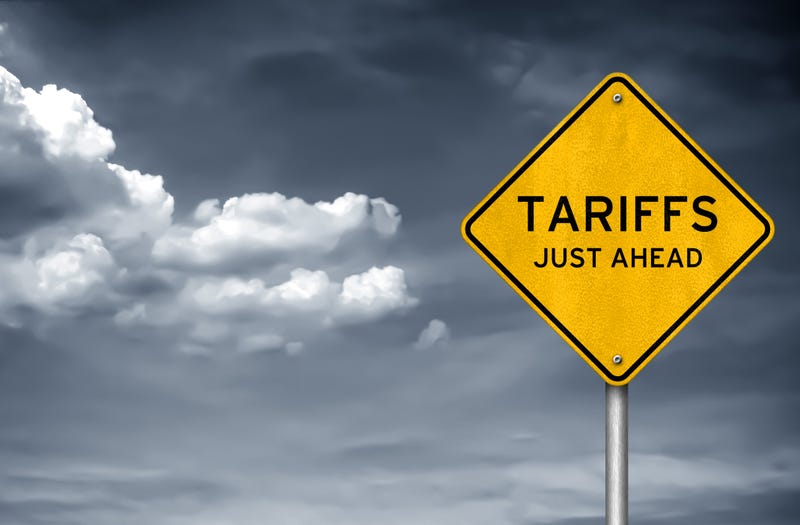
St. Louis, MO (KMOX) - What happens, now that the Trump Administration has announced a new round of global tariffs on goods imported to the United States???
KMOX's Total Information AM asked a local economist, and the answer is pretty simple: "Prices are going to go up."
Read on for more of our conversation with John Horn, Economics Professor at WashU Olin Business School or listen at the link below.
The far-reaching tariffs impact nearly all US trading partners, including a 34% tax on imports from China, 20% on the European Union.
Lynch: First question for you, has there been an imbalance in US trade relationships that needed to be addressed in this way?
Horn: That's a really interesting question. What I would say is, the US has had a trade deficit with a lot of countries, not all countries, but especially with China. We've had a trade surplus with some other countries like the UK... ...tariffs are a very blunt instrument to try to change who imports and who exports. And part of the reason why there is a large trade deficit in the United States with other countries is because the dollar is so strong, because it is essentially the world currency. And getting rid of that, it would also change trade balances, but it's not an outcome we want. So the simple answer is, do we have trade deficits? Yes.
Are tariffs the only way to get rid of it? No, and probably not the best way of doing it.
Lynch: When we look at the potential impacts of the actions Wednesday by the White House, what are we going to see globally both short and long term?
Horn: Well, short term, I think you're going to see, if the tariffs stay in place and if this isn't a negotiating ploy to reduce reciprocal tariffs back and forth, then I think you're going to see a reduction in trade. The tariffs are taxes, and we know when taxes are imposed that whatever activity the tax is imposed on, there's less of it. So we'll see less trade unless there's a lot of renegotiation of tariff rates around the world, and other countries agree to lower whatever rates they have on the United States and the US lowers the rates in return.
Longer term, it's going to depend on how long businesses think these tariffs are going to stay in place, because a lot of companies, especially when you're thinking about manufacturing, those investments can be 20 or 30 years in terms of building a new facility and investing in the infrastructure and If you think the tariffs are going to go away in a couple of years, it doesn't necessarily make sense to build manufacturing in the US to avoid those tariffs.
On the other hand, if we think that they're going to stay in for a very, very, very long time, then companies might start to invest more in the US.
Lynch: You mentioned that there might be some negotiations on the part of some of America's trade partners. What does this do to global trade relationships and where do you see things possibly shifting in our partnerships?
Horn: Well, I think that what's interesting is that sort of what we're seeing coming out of China is a lot of outreach to say we're not going to do this to you. China put out a statement... ...right before [Wednesday's] announcement saying that they had agreed to respond with Japan and South Korea to any tariffs which are imposed on any of the three of them.
I think the question is, will other countries turn to China and look to China to be a core trading partner to avoid the tariffs, or does the rest of the world still see the United States as the key trading partner that they need to have? And how that plays out is an unknown.
I think the other thing is when we look at some of the numbers that the Trump administration put out in terms of the tariffs that are being imposed on us and why we need to have reciprocal tariffs. They included other things like regulations and currency manipulation, which can have an effect on trade, but it's not necessarily something which is a tariff. And so how countries negotiate with -- we only have a tariff of 10%, you're claiming it's 50% because of these other things -- is going to get a much harder negotiation.
Lynch: What's it mean for middle-class Americans?
Horn: Prices are going to go up. Taxes logistically are imposed on the importer. So the simple example is if Walmart buys a T-shirt from Vietnam and then sells it to a consumer of the US, Walmart writes the check to the US government for that tariff. Now they can try to get the Vietnamese manufacturer to lower their prices, but they may not be able to lower it by the, you know, 50% to make up for the tariff, and Walmart's probably not going to eat that 50% tariff for themselves, so they're going to pass that price on to US consumers.
It there might be some products where consumers don't pay more, but in general, prices are almost certainly gonna go up, especially with tariffs these large.
@2025 Audacy St. Louis (KMOX). All rights reserved.
